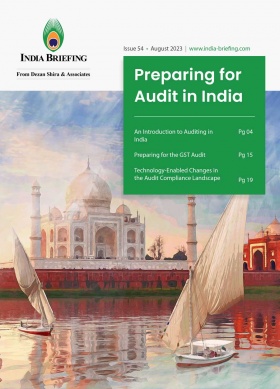Procedure for Registration with India’s Special Value Branch
Importers must register with India’s Special Value Branch (SVB) if they are affiliated with their suppliers, as per Customs Department requirements. We discuss how customs authorities assess related party transactions and the registration process with the SVB.
India’s Customs department houses a specialized unit known as the Special Valuation Branch (SVB). This unit plays a pivotal role in scrutinizing transactions involving Indian importers and foreign suppliers with close affiliations such as joint ventures, partnerships, or holding-subsidiary relationships.
The primary objective of SVB is to ensure that these relationships do not unduly influence transaction terms and pricing, adhering to Customs Valuation (Determination of Value of Imported Goods) Rules, 2007.
Beyond examining special relationships, SVB also handles complex situations necessitating adjustments in the declared transaction value by importers, as specified under Rule 10(1)(c), Rule 10(1)(d), or Rule 10(1)(e) of these rules.
Procedure for registration with the Special Value Branch
Who needs to register with SVB?
Importers must register with the SVB if they have affiliations with their suppliers as specified in:
- Rule 2(2) of the Customs Valuation (Determination of Value of Imported Goods) Rules, 2007
- Rule 2(1) of the Customs Valuation (Determination of Value of Export Goods) Rules, 2007
- Section 14(1) of the Customs Act, 1962
What is the SVB registration process?
- Filing of declaration and supporting documents
- Importers must file a declaration in Annexure-A at the time of submitting the bill of entry to Customs Authorities. This declaration should be accompanied by the necessary supporting documents.
- This step occurs before the goods are cleared from the Customs Port.
- Examination by the authorized customs officer
- The authorized office of examines the circumstances surrounding the sale and the invoice value of the goods.
- If deemed necessary, the Proper Officer may refer the case to the SVB for further investigation.
- Information request in Annexure-B
- If the case is referred to the SVB, the office of the customs may request further information from the importer using Annexure-B.
- The importer must provide all requested information and documents to the jurisdictional SVB within 60 days.
- Failure to respond to Annexure-B within the prescribed time may result in the collection of an additional Extra Duty Deposit, computed up to five percent of the declared assessable value of goods, on subsequent imports cleared on a provisional basis for three months.
What triggers an investigation by India’s special value branch?
Every importer engaged in importing goods is obligated to declare whether the supplier and buyer in India have any affiliations as related parties. In the affirmative, it becomes pivotal to ascertain whether this relationship has influenced the transaction’s price. In such instances, SVB investigations become essential, and the transaction must undergo meticulous review and inquiry.
The trigger for SVB investigations is the arrival of the first consignment from a foreign country during the import of goods by the importer from the related party. The importer is mandated to furnish a declaration, along with the bill of entry and a questionnaire in Annexure A. Additionally, SVB investigations can also be initiated for unrelated party transactions in specific situations, including royalties and license fees, subsequent resale or disposal, and other connected payments.
What are the documents required for SVB registration?
To complete the SVB registration process, importers may be asked to provide various documents, including:
- Photocopies of relevant Bills of Entry
- Sample invoices of imports during the last three years
- Annual reports for the previous three years (if the importer is a Company)
- Current price list of products imported from the foreign supplier
- Agreements with the foreign supplier (Collaboration agreement, Joint Venture agreement)
- Statements of the CIF (Cost, Insurance, and Freight) value for the last three years, duly certified by a Chartered Accountant:
-
- CIF value and landed cost of imports from related foreign suppliers
- CIF value and landed cost of imports from other suppliers
- Ex-factory value of the goods
- Royalty, net and gross, paid or payable
- Statement of equity capital held in a foreign company for the last three years (if applicable)
- Statement of shareholding in an Indian company along with particulars of common Directors
- Sample invoices and bill of entries of imports of identical or similar goods by any other person
- Payment details, including remittances with deferred payments (if any)
- Details regarding any other payment made to or on behalf of or under the instructions of the supplier
When is SVB registration not mandatory?
SVB registration is not mandatory in the following situations:
- Import of goods as samples and prototypes from related sellers: If you are importing goods as samples or prototypes from suppliers with whom you have a related relationship, SVB registration is not required.
- Imports from related suppliers with fully exempt or nil duty: When importing goods from related suppliers, and the applicable customs duty is fully exempt or nil without any conditions, SVB registration is not mandated.
- Low-value transactions: For transactions where the value of the imported goods is less than INR 100,000, SVB registration is not necessary. However, it’s important to note that this exemption applies as long as the cumulative total of such transactions does not exceed INR 2.5 million within a single financial year.
 Evolution of the SVB in India: Addressing discrepancies in import-export transactions
Evolution of the SVB in India: Addressing discrepancies in import-export transactions
The establishment of the special value branch stemmed from the need to rectify discrepancies in import and export transactions. In numerous cases, importers employed unconventional valuation methods that deviated from prevailing market conditions, potentially conferring benefits on themselves and their counterparts.
To address this issue, the Customs department issued Circular No. 1/98 on January 1, 1998, designating SVB as an operational entity responsible for overseeing transactions involving related parties. It is crucial to note that these circulars were crafted in alignment with the Customs Valuation (Determination of Price of Imported Goods) Rules, 1988, which have since been replaced by the Customs Valuation (Determination of Value of Imported Goods) Rules, 2007.
Related party transactions
Transactions between related parties are diverse and the nature of their relationship can significantly impact the declared value of a transaction The definition of related parties varies across different laws and statutory provisions, encompassing income tax, company law, accounting standards, SEBI, Goods and Service tax, and even Customs regulations.
As such, when the relationship becomes pertinent under a specific legal provision, it becomes imperative to reference the relevant provisions and consider other pertinent factors related to valuation, assessment, and other parameters. This may necessitate adjustments to the pricing structure to ensure compliance with applicable laws and regulations.
Determining related parties in customs valuation
Under the Customs Act, 1962, the SVB has the authority to investigate transactions between an Indian importer and a related foreign supplier. This investigation is triggered when the parties involved are deemed “related” as per Rule 2(2) of the Customs Valuation (Determination of Value of Imported Goods) Rules, 2007.
Rule 2(2) of these Customs Valuation Rules outlines the criteria for establishing a “related” relationship for customs valuation purposes. According to this rule, the following individuals or entities are deemed “related” in the context of customs valuation:
- Officers, directors, or partners in each other’s businesses: Individuals who hold positions as officers, directors, or partners in each other’s businesses fall under this category.
- Employer-employee relationship: This category includes scenarios where there is an employer-employee relationship between the parties.
- Direct or indirect ownership or control: Related parties encompass situations where a person directly or indirectly owns, controls, or holds at least five percent of the voting stock or shares in both entities.
- Third-person control: Parties are considered related when a third person directly or indirectly controls both entities or when they jointly control a third person.
- Members of the same family: Parties sharing familial ties are regarded as related for customs valuation purposes.
- Sole agent or sole distributor: Situations where one entity acts as the sole agent or sole distributor of the other are also included in the definition of related parties.
About Us
India Briefing is produced by Dezan Shira & Associates. The firm assists foreign investors throughout Asia from offices across the world, including in Delhi and Mumbai. Readers may write to india@dezshira.com for more support on doing business in India.
We also maintain offices or have alliance partners assisting foreign investors in Indonesia, Singapore, Vietnam, Philippines, Malaysia, Thailand, Italy, Germany, and the United States, in addition to practices in Bangladesh and Russia.
- Previous Article India Approves Viability Gap Funding Scheme for Battery Energy Storage Systems
- Next Article Bengaluru, India: Foreign Investment Brief








